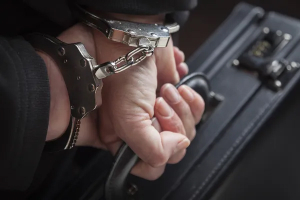
Felony charges are serious no matter which state you reside in or which state you are in when you are charged with a felony. There are many questions that a person who has pending felony charges may want to ask.
Questions about traveling out of the state and traveling if the felony charges occur in one state, but you reside in another state are some common situations for felony defendants who have charges pending against their face.

The legal implications of leaving the state with a pending felony charge against you depend on several factors. If you are a person who traveled from your home state across state lines for a championship game or traveled to another state while on vacation, committed a crime there, and then returned to your home state immediately afterward, you may not know right away that you have pending felony charges.
If you reside in a state and are arrested, you need to know the legal implications if you leave the state. Do not leave the state once you are charged with a crime without express permission from the court that has jurisdiction over your case. Your bail conditions also factor in questions about leaving the state.
Once you know about the felony charge, you must comply with all court orders. Although courts usually allow criminal defendants to travel if they have certain misdemeanors pending, the situation is different for anyone charged with a crime that is a felony offense. This is true even if you commit one crime that is a misdemeanor and another crime that is a felony.
There are serious potential consequences for people crossing state lines to avoid appearing in court on pending felony charge or charges. The consequences will likely vary according to the state where you are charged with a crime and the specific felony crime.
A judge with the court that has jurisdiction can order a bench warrant for your arrest or can issue an order for your extradition to face the felony charges.
Felonies are serious crimes that can result in a defendant spending many years or even a lifetime in prison upon conviction. Felony convictions can seriously affect your future employment and other future aspects.
If you are under investigation but unaware of it, you may not know immediately that the court indicted you on felony charges. This is especially true for out-of-state defendants who returned to their home state after allegedly committing a felony.
Courts often place travel restrictions on a defendant charged with a felony, even if they have a misdemeanor offense which would usually not affect their ability to travel.
Criminal defense attorneys with experience representing defendants charged with felonies know to explain the nature of the felony charges and the rules governing leaving the state with pending felony charges.
Although there may be travel restrictions placed on a defendant with any pending felony, there are some common types of felony offenses for which the court orders the person not to travel to other states. Courts may order the arrest of anyone who leaves the state violating a court order.

Drug crimes are serious crimes often punishable by law with penalties such as paying hefty fines and spending up to several decades in prison. Drug trafficking is one of the most serious offenses.
Some similar crimes that are often a part of crimes involving drugs include money laundering, drug possession, manufacturing or cultivating drugs, and distribution of drugs. If you face prosecution for felony drug crimes, the court will unlikely let you leave the state.
Theft is not always a petty offense prosecuted as a misdemeanor charge. The states vary in their laws regarding felony theft.
One example is that according to the Ohio Revised Codes, felony theft is “If the value of the property or services stolen is one thousand dollars or more and is less than seven thousand five hundred dollars.”
California, on the other hand, defines felony grand theft in California Penal Code 487(a) as “When the money, labor, or real or personal property taken is of a value exceeding nine hundred fifty dollars ($950).” Several conditions meet the definition of felony theft in California, such as shoplifting an item that has a $1,000 price tag, stealing valuables worth more than $950 during a home invasion or burglary, and stealing an automobile or a firearm.
A felony theft conviction can affect employment prospects, housing opportunities, and other opportunities when an employer, landlord, or business checks your criminal record.

Felony cases involving sex crimes are serious offenses that may result in the alleged offender being unable to leave the state, even if they live with family in another state. A person who is arrested by the police or other law enforcement officers for some sex crimes may lead the court to order the defendant to remain in the state pending the trial's outcome, regardless of whether they post bail money to get out of jail.
Some felony sex crimes often include child pornography, forcible rape, committing sexual acts with a minor, and sexual assault.
Any crime that includes an element of violence may be considered a violent crime that carries significant penalties. A judge often orders defendants to remain in the state where the alleged violent crime occurred until after the conclusion of the trial.
Some examples of felony violent crimes include murder, rape, mayhem, and armed robbery.
An individual guilty of a violent sex crime may spend many years in prison. Most states will not take it lightly if someone facing felony sex offenses leaves the state to avoid prosecution.

Judges usually can consider pre-trial release once you appear in court after you pay your bail money. Whether the judge does that is based on several circumstances. The court will likely consider whether you reside in the state but are considered a flight risk if you have a prior felony criminal record and the severity of the current felony charges.
If you cannot post bail or your bail is denied, you will likely await your trial at least until your next court date.
Your immigration status may carry considerable weight when you are charged with a felony offense. The prosecutor may fight your release from custody, or your ability to travel if you are not a legal American citizen or an immigrant considered a flight risk.
A local attorney can help someone facing issues with their immigration status understand the charges against them.

It is important to understand what you can and cannot do if you are facing pending criminal charges. Although you are usually free to travel if you have pending misdemeanor charges, there may be some restrictions. Do you have a prior criminal record? Are you charged with a felony committed at the same time as the misdemeanor charge?
If you are facing felony charges, you are likely unable to travel outside the state. Courts may not rule in your favor to travel even if you live in another state.
Are you on parole? Regardless of whether you can travel while facing the misdemeanor, it would help if you still abide by your parole conditions. California parole conditions require that parolees obtain permission from their parole officer before traveling more than 50 miles from their home. Parolees must get permission and a travel pass to travel outside the state.
Violating travel restrictions when you have pending felony charges is a serious matter. If you do not appear for any criminal proceedings because you left the state, the court may issue a bench warrant for your arrest.
The judge will likely take further action against any defendant violating travel restrictions. You are likely to be deported back to the state where you face the charges and ordered held for trial. Sex offenders who fail to register and flee the state and people who commit other certain crimes may face a new charge if they violate travel restrictions.

You need an experienced, compassionate criminal defense attorney to guide you through understanding the charges against you. Your criminal defense attorney will prepare a solid defense strategy.
Contact Hurwitz Law Group today at (323) 747-7484 or online to schedule your free initial consultation.
People often have questions regarding felony charges and their ability to travel when facing a felony charge.
Many acts of violence are considered felony acts. Examples of acts of violence that are usually felonies include murder, rape, attempted murder, or attempted rape. Other examples include certain sex and certain drug crimes, such as drug trafficking.
Any crime that depicts an element of violence that is considered dangerous to society may be an act that is regarded as a felony charge.
You must remain in the state where you have the pending felony charge until the court allows you to leave the state. Some courts require that the accused remain in the state until the conclusion of the trial and the person is found innocent, at which time they may leave the state.
A person found guilty will have their punishment imposed after the trial and serve their sentence where they committed the felony, not the state where they reside.
The complainant may drop felony charges under certain circumstances. If the prosecutor does not have enough evidence to prove the person guilty at trial, they may drop the felony charges. If evidence taken at the scene proves that someone else other than the defendant committed the crime or if someone else confesses to the crime, the state may drop the felony charges.
Judges look at several factors when setting bail for a defendant. Courts may charge a higher bail amount for a defendant who lives out of state.
The court still refunds bail for people who live far away as long as they appear at their scheduled hearings. The court keeps the bail money and issues a bench warrant for someone who fails to appear even if they reside in the same state.
One example is if a person faces a driving under the influence charge in one state but the person lives in another state. If the person fails to appear on the drunk driving charge and does not hire an attorney to represent them in court, the court forfeits the bail and may issue a bench warrant for that individual's arrest.
Yes, you may be held in jail for an out-of-state arrest on serious charges if a bench warrant was issued because you failed to appear or if you face serious charges.
Search
Categories